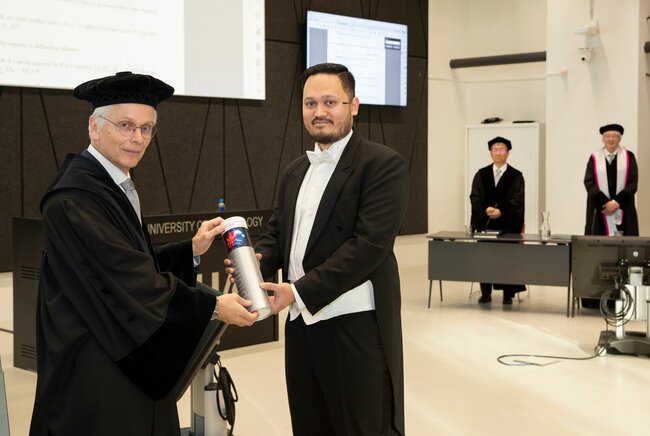Advancing Process Control using Orthonormal Basis Functions
Alrianes Bachnas defended his PhD thesis at the department of Electrical Engineering on February 16th.

Ever growing demands for both consumer and industrial products drive chemical and petrochemical industries to optimize the quantity and quality of their production. The companies that have the core business in the process industry are competing with each other to dominate the market. Development of the current process technologies provide a competitive edge for companies to ensure their leading market positions. For his PhD thesis Alrianes Bachnas investigated new methods to improve the performance of Advanced Process Control (APC) by taking into account model inaccuracy and variation of process dynamics that are causing the plant-model mismatch. The control mechanism is based on Orthonormal Basis Functions (OBFs) as a novel prediction model.
Potential implementation
The first part of this thesis, Chapter 2-3, addresses methods to optimally select basis poles of the OBFs model from a finite set of system poles. Furthermore, a method to utilize the proposed algorithms for a model of a system that is obtained via system identification procedure is provided. Lastly, by conducting a simulation study, it is showed that the proposed methods outperform the state of the art basis selection algorithm while maintaining a reasonable computational load of each algorithm. This leads to potential direct implementation in industrial practice.
Direct applicability
The second part of this thesis, Chapter 4, addresses the case where the OBF-based prediction model is adapted per control cycle to capture the time-varying behavior of the system of interest. The adaptation is based on an iterative identification procedure of the coefficients of the OBF prediction model. Conducting system identification for OBF-based model has a strong benefit due to direct applicability of the PEM identification framework and hence the consistent estimation of the OBF model coefficients. Afterwards, the MPC scheme for OBF-based prediction model is formulated. The MPC scheme, as well as the feasibility and stability results, are then extended to the time-varying case. The proposed MPC is first tested in academic case study, where it is shown that the proposed method can capture the time-varying dynamics of a given system and manage to achieve the goal of set-point tracking.
Set-point tracking
The third part of this thesis, Chapter 5, addresses the case where the OBF-based prediction model describes variations in the dynamics of the system of interest that can be characterized by an external signal called the scheduling variable. Two LPV identification approaches are provided to identify the LPV-OBF model before the MPC is commissioned. The local LPV identification approach can be seen as an interpolation of the dynamical behavior of the system, while the global LPV identification approach is a direct identification method based on a single data set that is measured from the system. Afterwards, the LPV-OBF MPC scheme is formulated. The MPC scheme utilizes a designated steady-state target and extra penalty term for tracking purposes. The space of the steady-state pair is characterized by a vector which is used as an argument of minimization for the MPC problem. Such setting helps in establishing feasibility and stability guarantees of the MPC scheme. The proposed MPC is first tested in academic case study, where it is shown that the proposed method can capture the parameter varying dynamics of a given system and manage to achieve the goal of set-point tracking.
Excellence in different conditions
The last part of this thesis is where the proposed LTV-OBF MPC and LPV-OBF MPC are tested in two industrial case studies. High purity distillation column case and Dual distillation column case, which are commons in process industry, are used for the demonstration. Each of the proposed control excel in different conditions where the knowledge of the variations of system dynamics becomes the key element that differentiate the two proposed MPC schemes.
Title of PhD-thesis: Advancing Process Control using Orthonormal Basis Functions. Supervisors: Siep Weiland and Roland Tóth .